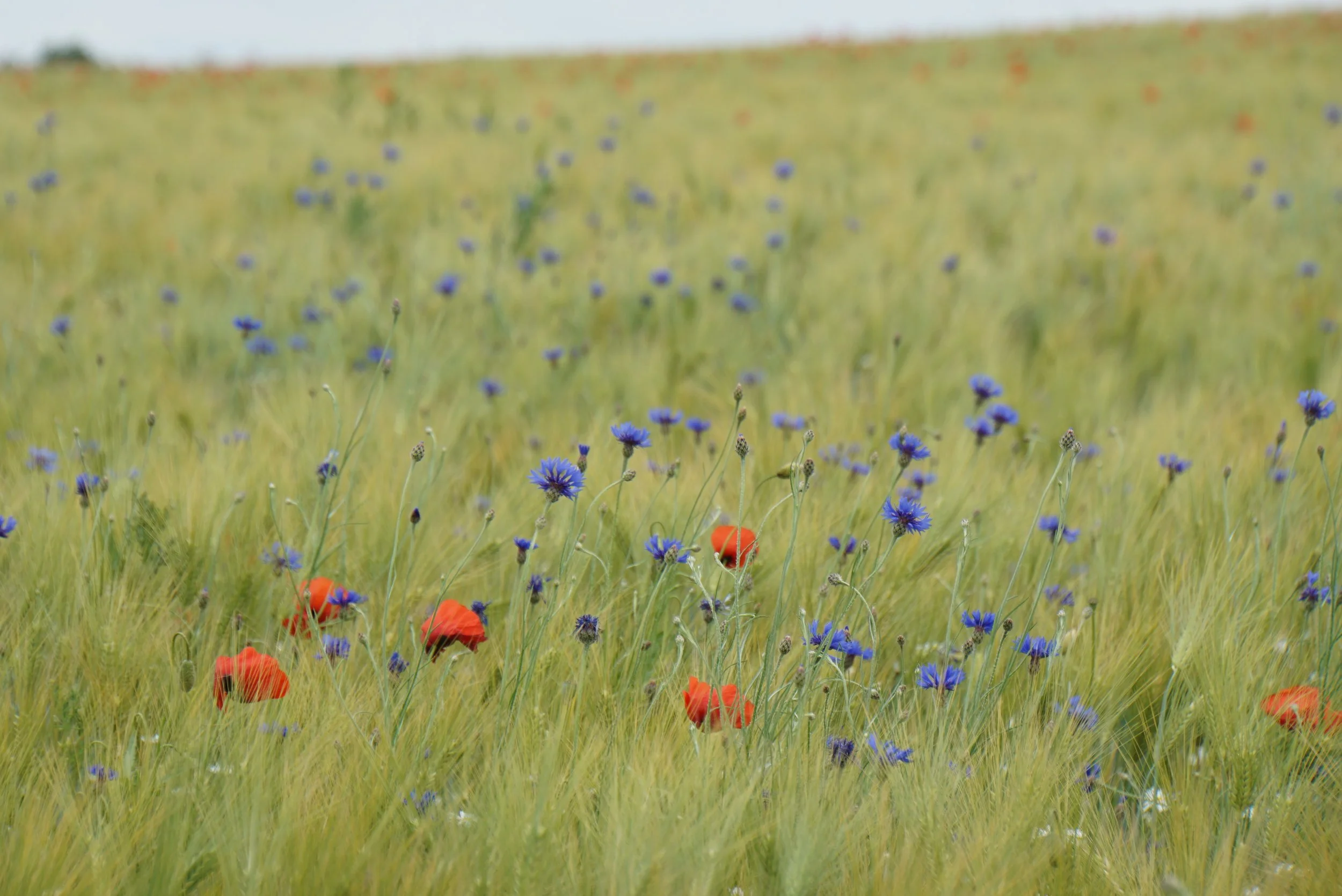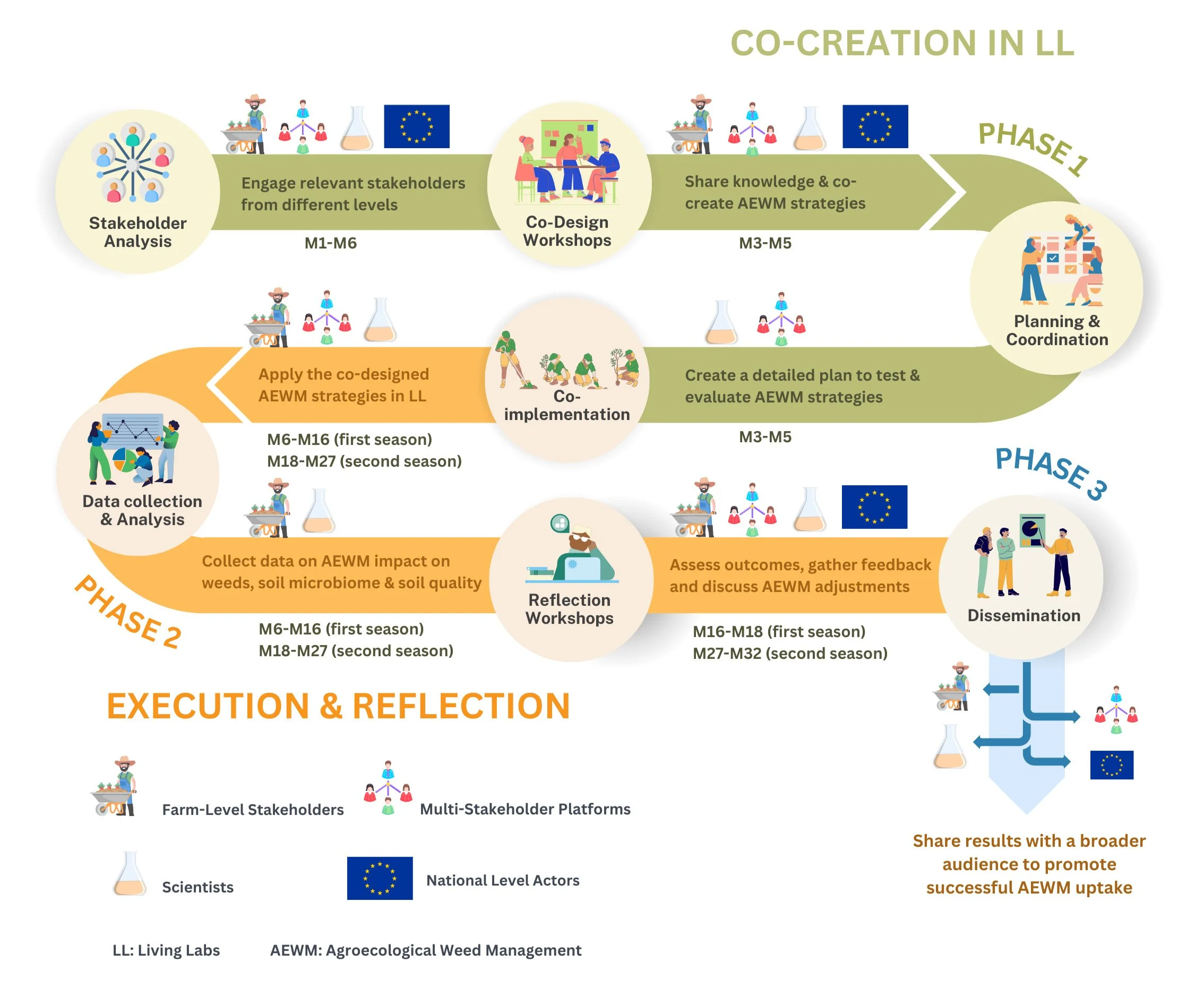AGROSOIL
Agro-Ecological Soil Optimization for Integrated Weed Management
Duration: 05/2025 - 04/2028 (tbc)
Summary
In European cropping systems, most weed management practices rely on herbicides and/or intensive tillage. However, these practices have great environmental impacts and may negatively affect soil quality and the soil microbiome (SM). Reducing the reliance on these practices is one of the key ways to make crop production more environmentally and socioeconomically sustainable. So far, transitioning to agroecological weed management (AEWM) at the farm level is hampered by knowledge gaps and insufficient practical evidence. AGROSOIL will use a living lab (LL) approach to co-create and co-implement AEWM strategies that manage weeds by utilising and supporting the SM. This will support the transition to more ecologically-based crop production with less reliance on chemical inputs and intensive tillage.
Source: Sabine Andert
This project will explore the beneficial potential of soil and plant microbiomes, integrating functional and ecological principles into practical AEWM strategies. The objective is to foster a significant shift towards agroecology across Europe by 1) optimising the diversity and functionality of the SM through AEWM, 2) identifying soil-microbial communities and pathways that support AEWM and 3) developing holistic AEWM systems that significantly reduce chemical inputs and tillage-intensity and support ecosystem services and beneficial biological interactions within agro-ecological cropping systems.
The project intends to build and strengthen regional networks of stakeholders in a LL setting to promote the adoption of AEWM. In the LLs, agro-ecological research is combined with real-world experimental settings where farmers, researchers, and other stakeholders collaboratively create, implement, evaluate and refine sustainable soil and weed management practices. This participatory methodology ensures that innovations are not only scientifically sound but also practically viable and tailored to the diverse needs of European crop production systems.
Source: Sabine Andert
With eight partners from five European countries, representing diverse European climatic and arable production conditions, AGROSOIL is structured around six work packages (WPs, Fig. 1): WP1 Project coordination and management focuses on the administrative backbone of the project. WP2 Co-Innovation is dedicated to the co-creation of AEWM, engaging multiple stakeholders in LLs to ensure a high adoption of the developed AEWM strategies. WP3 Plant-microbe Interactions delves into the SM, exploring its role in functionally supporting AEWM under varying agricultural practices. WP4 Field validation puts theory into practice, experimentally testing the implementation of AEWM approaches with active stakeholder participation. WP5 Functional diversity evaluates the interactions between different AEWM and the SM including impacts on weed population dynamics and functional diversity. WP6 Social and economic impacts focuses on assessing the socioeconomic viability of the proposed agro-ecological solutions.
Communication, dissemination and stakeholder engagement are pivotal components of AGROSOIL, with a comprehensive strategy to maximise project impacts. Through direct stakeholder engagement, publications in scientific journals and farming magazines, workshops, online- and offline educational materials, AGROSOIL will disseminate its findings widely, empowering stakeholders with the knowledge and tools necessary for transitioning to more agro-ecological cropping practices.
Source: Sabine Andert
Coordinator
Sabine Andert
Julius Kühn Institute (JKI), Federal Research Centre for Cultivated Plants (JKI-A), GERMANY
Source: Sabine Andert
Partners
Björn Ringselle - Research Institutes of Sweden (RISE), SWEDEN
Bàrbara Baraibar Padro - University of Lleida (UdL), SPAIN
Zahra Bitarafan - Norwegian Institute of Bioeconomy Research (NIBIO), NORWAY
Merel Hofmeijer - Wageningen University & Research (WUR), NETHERLANDS
Anne-Charlotte Hoes - Stichting Wageningen Research (WR), NETHERLANDS
Doreen Babin - Julius Kühn Institute (JKI), Federal Research Centre for Cultivated Plants (JKI-EP), GERMANY
Eva Hernandez Plaza - The Spanish National Research Council (CSIC), SPAIN
Laia Vinas - Agrupació De Defensa Vegetal De Producció Ecológica De Ponent, SPAIN
Isadora Schmidt - Terra Viva, SPAIN
Agustin Troya - Cereales Locales Ecologicos, S.C.A., SPAIN
Source photos banner:
Weeds: Photo by Semyon Borisov on Unsplash
Soil: Photo by Szőllősy Benjamin on Unsplash







